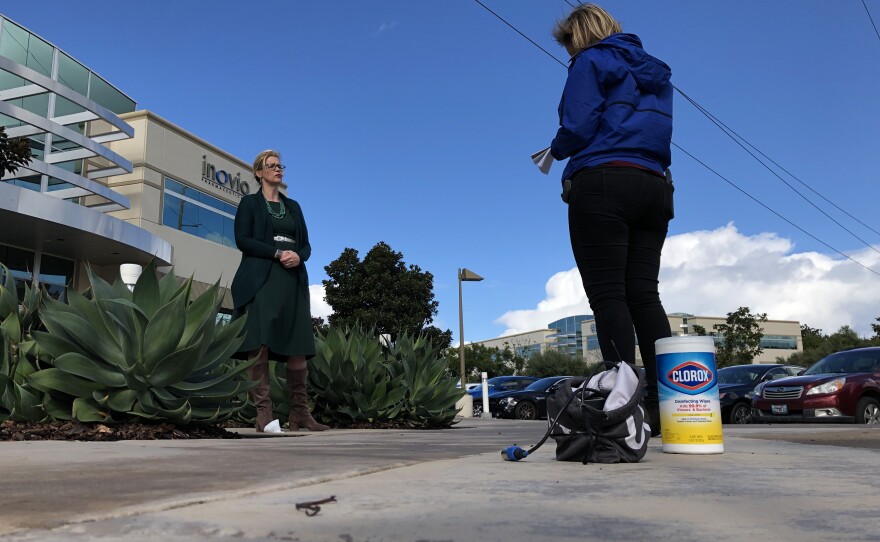The local lab Inovio Pharmaceuticals is hoping to fight the coronavirus pandemic with its experimental DNA-based vaccine. KPBS News has been following the progress at the Sorrento Valley facility since January and checked in with Senior Vice President of Research and Development Kate Broderick to learn about the team's progress.
RELATED: San Diego Lab’s Potential Coronavirus Vaccine Could Help Beyond Outbreak
As an extra precaution during the coronavirus pandemic, KPBS Health Reporter Tarryn Mento interviewed Broderick just outside Inovio's doors, to which public access has been limited to reduce any risk of transmission. Broderick explained the company hopes to have 1 million doses of the vaccine by the end of the year for further study or possibly emergency use.
Q: What's the latest with the vaccine?
A: We've managed to accelerate the timelines considerably, so we're now looking at (starting the human testing) next month in April. We don't have an exact date yet. As you can image there's still a lot of organization, a lot of moving parts at the moment. But when you think that we only started designing this vaccine on the 10th of January, it's pretty remarkable that we're aiming to be in the clinic by next month.
Another goal we've set ourselves ... by the end of the year we've hoped to have 1 million doses ready for distribution which (is) really quite a remarkable scale up from kind of a small-scale trial that we're doing at the moment.
- What is coronavirus?
The novel coronavirus, or COVID-19, is a virus that can infect animals and humans. It causes a range of respiratory illness, fever, cough and in more severe cases can cause pneumonia and even death. - What are the symptoms?
The following symptoms may appear 2-14 days after exposure: fever, cough, and shortness of breath. - Get all coverage →
Government Resources
Q: There's still a lot more testing to go. Why have 1 million doses ready to go by the end of the year? What's the point?
A: I think it's just really good to have a figure to target. We thought that on the scale up basis, targeting 1 million doses — it's still a significant number, a number that could be used to really protect people: health care workers, frontline medical professionals that are going to potentially really need this vaccine and also potentially people who have underlying health issues as well, which is obviously a tier-one group that needs to be protected.
Q: If the first human trial begins in April, are you expecting to complete the mandated second and third rounds of trials by that time, by the end of the year?
A: No, absolutely not. So as I mentioned, we'll be starting our phase 1 testing in April. We would hope to get an interim readout which means you would start to get to see, you wouldn't get through the whole trial, but you would get some of the data out of that certainly by late summer, autumn, fall time. And then we'd be hoping to move into the phase 2 trial, which is where we can actually ask the question: does the vaccine work to protect people against the virus? We would hope to do that very, very quickly and so of course that would have to have the say-so of the regulatory authorities.
Q: Is it the thought that those tier-one individuals would be part of the phase 2?
A: Potentially, yes. Absolutely.
Q: With the first phase of the trials starting next month, you've already identified the locations where that will occur?
A: That's correct. We're going to be two sites for our phase 1 trial starting in the U.S. in April. We're looking at one site at the University of Pennsylvania and one site in Kansas City.
Q: You've started recruiting people for that already?
A: It's very interesting, and maybe not something that's terribly surprising, is the number of interest that we've got from people, a lot of people already volunteering to be part of those trials, which is really fantastic and it's great to see so many people that want to be part of the solution.
Q: Is that unusual?
A: Yes.
Q: You've also submitted your results from animal testing to a peer-reviewed journal. Can you explain what that means and when we can expect to see those published?
A: In the scientific realm, it's really important that your data is validated through peer review. By that I mean you send it out to peers, colleagues in the same scientific sphere, and have them evaluate the data so that it's credible, it's rigorous. We very quickly put together a manuscript summarizing the work that we've done so far on the vaccine and we've submitted that to Nature Communications, a very high-tier journal. It's under review at the moment. We're hoping to have that published and be in the public realm within a matter of weeks.
Q: Is there anything else I haven't asked that you think is important for people to know?
A: I think, just since the last time we spoke, all the schools in San Diego have closed down. My husband was at the supermarket yesterday and said there's nothing left on the shelves. I think from the last time we spoke, it's almost unimaginable how much the situation has changed here in San Diego, but (also) in California in general and of course across the states, not specific to vaccine development but really just specific to society in general. Who would've thought we'd be in the situation that we're in today.






